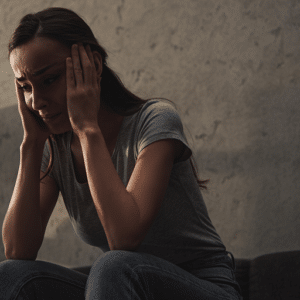The National Alliance on Mental Illness defines psychosis as an episode in which an individual has a break from reality. It often includes hallucinations and delusions or strong false beliefs despite evidence to the contrary. Substances such as alcohol and cocaine can cause drug-induced psychosis.
What is Drug-Induced Psychosis?

Drug-induced psychosis or substance-induced psychotic disorder occurs from taking too much of a specific drug, having a negative reaction to a mixture of drugs, during withdrawal, or when there is an underlying mental health disorder. While drugs did not trigger severe mental disorders when they didn’t previously exist, drugs can be a trigger for someone prone to psychosis.
Drug-induced psychosis often includes delusions and hallucinations. Delusions are irrational beliefs an individual holds even when given evidence showing otherwise. Hallucinations are intense sensory perceptions that are not real. They cause vivid feelings, sights, and sounds that do not exist.
How Does Drug-Induced Psychosis Happen?
Drug-induced psychosis happens when a person takes too much of a drug, and their body cannot process it fast enough. This causes distressing symptoms and can lead to a fatal overdose. Knowing the signs and symptoms of drug-induced psychosis is crucial to preventing further harm or death.
What are the Signs and Symptoms of Drug-Induced Psychosis?
The signs and symptoms of drug-induced psychosis often include delusions, hallucinations, or both. People experiencing these symptoms rarely understand their delusions and hallucinations are not real.
Delusions and Psychosis
Delusions are thoughts and beliefs that are unrealistic. There are various types of delusions, including:
- Persecutory – thoughts that others like the government are watching you or out to get you
- Grandiose – beliefs that you are gifted, special, and better than others
- Referential – believing that people and the environment are sending personal messages to you
- Erotomanic – a belief that people are in love with you despite the contrary evidence
- Nihilistic – thinking a disaster will happen
- Somatic – a belief that something is wrong with your body
Hallucinations and Psychosis
People having hallucinations have one or more intense sensory experiences. However, these sights, sounds, and physical sensations are not real. Types of hallucinations from drug-induced psychosis include:
- Auditory – hearing voices or sounds that are not real
- Visual – seeing things that are not real
- Olfactory – smelling scents that are not present
- Tactile – feeling like someone or something is touching you when nothing is touching you
- Gustatory – tasting something when your mouth is empty
Does Alcohol Cause Drug-Induced Psychosis?
Alcohol is a drug that may induce psychosis. A person with alcohol use disorder or AUD may experience alcohol hallucinosis. This causes symptoms such as hallucinations, paranoia, and fear. It occurs from brain damage and Vitamin B1 deficiency from long-term alcohol abuse.
Vitamin B1 deficiency also may lead to Wernicke-Korsakoff syndrome. Delirium Tremens or DTs can also cause psychotic symptoms, including anxiety, insomnia, and seizures.
Signs of delirium tremens include:
- Agitation
- Excitement
- Irritability
- Confusion
- Delirium
- Sudden mood changes
- Fatigue
- Restlessness
- Body tremors
- Decreased attention span
- Sensitivity to light, sounds, or touch
- Hallucinations
- Seizures
DTs are a medical emergency, and up to 5 percent of people die from DTs.
Drugs that Induce Psychosis
Long-term heavy use of drugs may induce psychosis. However, certain drugs are more likely to lead to drug-induced psychosis.
Methamphetamine use can lead to paranoia, persecutory delusions, and visual and auditory hallucinations. A common hallucination is the feeling of bugs crawling on the skin. This may subside once a person stops using the drug, or symptoms may last for weeks or months and increase the risk of a future event.
Common symptoms of methamphetamine-induced psychosis include:
- Constantly scratching the skin
- Skin sores on arms, legs, face
- Hallucinations
- Delusions
- Paranoia
- Increased aggression or violence toward themself or others
Experts have long associated cannabis use and psychosis. High levels of THC can induce schizophrenia-like psychotic symptoms such as paranoia, delusions, anxiety, and hallucinations.
Other symptoms of cannabis-induced psychosis include:
- Disorganized speech
- Unusual thoughts
- Memory loss
- Confusion
- Grandiose thoughts and beliefs
- Trouble expressing emotions
- Unusual excitement
- Being uncooperative
Up to 50 percent of people who use cocaine will have some symptoms of psychosis after use. This risk increases with a syringe or free-based use. Common symptoms include persecution delusions and tactile hallucinations. These symptoms can last from days to years after cocaine use stops.
Other common symptoms of cocaine psychosis include:
- False beliefs
- Paranoia
- Speech that doesn’t make sense
- Inappropriate behavior
The more a person uses cocaine, the worse the symptoms may become.
Amphetamine-induced psychosis is one of the most common types of drug-induced psychosis. It is typically short-lived and subsides once a person stops using it. However, it sometimes lasts after the drugs leave the body. Besides psychosis during use, amphetamines can cause withdrawal psychosis.
Symptoms of amphetamine-induced psychosis include:
- Extreme agitation
- Paranoid delusions
- Grandiose delusions
- Auditory hallucinations
- Visual hallucinations
- Disorganized thinking
- Trouble concentrating
- Rapid and illogical speech
- Erratic motor activity
- Lack of insight into the cause of the symptoms
Opioids are not typically associated with psychosis. However, people who use opioids may experience symptoms of psychosis while using opioids and during opioid withdrawal.
The most common opioids linked to drug-induced psychosis include:
- Morphine
- Fentanyl
- Methadone
- Tramadol
- Hydromorphone
- Buprenorphine
- Pentazocine
- Oxycodone
Withdrawal psychosis is linked to certain opioids, including:
- Tramadol
- Oxycodone
- Buprenorphine
- Methadone
- Heroin
In order to minimize withdrawal symptoms from drugs that induce psychosis, it is vital to seek help from a detox center.
Can Medications Cause Drug-Induced Psychosis
People think that because a doctor prescribed a medication, it is safe to take. However, there are medication drugs that induce psychosis, especially if you mix them or have certain underlying mental health disorders.
These medications include:
- Analgesics
- Anticholinergics
- Antiepileptic
- Antidepressants
- Antiparkinsonian medications
- Steroids
- Muscle relaxers
- Disulfiram
To reduce the risk of drug-induced psychosis, it is vital to discuss your medical history with your doctor.
Who is Most at Risk of Drug-Induced Psychosis?

People who abuse stimulants in high doses have an increased risk of drug-induced psychosis. Unlike hallucinogenics, high-dose stimulants cause both auditory and visual hallucinations along with delusions.
Additionally, people with substance use disorder (SUD) and co-occurring mental health disorders that produce psychotic symptoms are also at a higher risk of drug-induced psychosis. While challenging to differentiate between drug-induced psychosis and psychosis from a mental disorder, one way to tell is that psychosis from drug abuse typically ends once the drug use stops.
Diagnosing Drug-Induced Psychosis
The Diagnostic and Statistical Manual of Mental Disorders, 5th Edition (DSM-5) defines drug-induced psychosis as a psychiatric disease and lists the diagnostic criteria.
- The symptoms are not from a mental health disorder such as schizophrenia, which is not drug-induced
- Medical exams, lab results, and patient history show symptoms of psychosis develop during substance abuse or within a month of withdrawal from drugs that induce psychosis.
- Experiencing delusions or hallucinations or both
- Symptoms of drug-induced psychosis occur outside of episodes of delirium
- Symptoms cause significant difficulties in daily life and the ability to function
Symptoms of drug-induced psychosis typically wear off once the drug use stops. However, those with heavy long-term use may experience years of psychotic symptoms. To help minimize the symptoms of drug-induced psychosis, it is vital to seek substance abuse treatment.
Addiction Treatment for Drugs that Induce Psychosis
Being diagnosed with drug-induced psychosis can be scary, but finding the proper treatment will help you understand the disorder and teach you healthy coping skills for lasting recovery. Treatment should include substance use disorder and co-occurring mental health disorder treatment.
Treatment varies for each person depending on their drug of choice and specific needs. For some people, symptoms of psychosis may fade once the drugs leave the body. But, for chronic alcohol use disorder, intense withdrawal and addiction treatment may be necessary.
Although it is crucial to remove all drugs and alcohol from the body, it is just as important to continue with a substance use disorder and mental health treatment. A continuum of care or step-down program can reduce the chances of re-occurring drug-induced psychosis and encourage a life free of drugs and alcohol.
Some people need medications to reduce the symptoms of psychosis. Medications may also help stabilize a person’s mood. Addiction treatment centers may use medications such as:
- Benzodiazepines
- Selective Serotonin Reuptake Inhibitors (SSRIs)
- Antipsychotics
While the withdrawal or detox step in recovery typically stops the symptoms of psychosis, continuing into treatment for addiction and co-occurring mental health disorders can stop the cycle and downward spiral of addiction.
Treatment should include evidence-based therapies, including:
- Individual therapy
- Cognitive Behavioral Therapy (CBT)
- Dialectical Behavior Therapy (DBT)
- Eye Movement Desensitization and Reprocessing (EMDR)
- Group therapy
- Family therapy
Psychotherapy helps you understand your thoughts and moods before psychotic episodes occur, manage your emotions, and be aware of triggers. Family therapy involves those closest to you and can be your strongest support system. It helps them understand and manage your drug-induced psychosis and how to best support you.
Holistic therapies treat the whole person – mind, body, and spirit. Meditation and mindfulness are examples of holistic therapies. When these therapies become part of your daily self-care routines, you reduce the risk of relapse with drugs that induce psychosis and manage the symptoms of a psychotic episode arises.
Regain Control of Your Life at New Directions for Women
Drug-induced psychosis and addiction can be scary for you and your loved ones. If you or a loved one has lost control of their lives to drugs or alcohol, we can help you get your life back. Contact us today to start your life in recovery.



